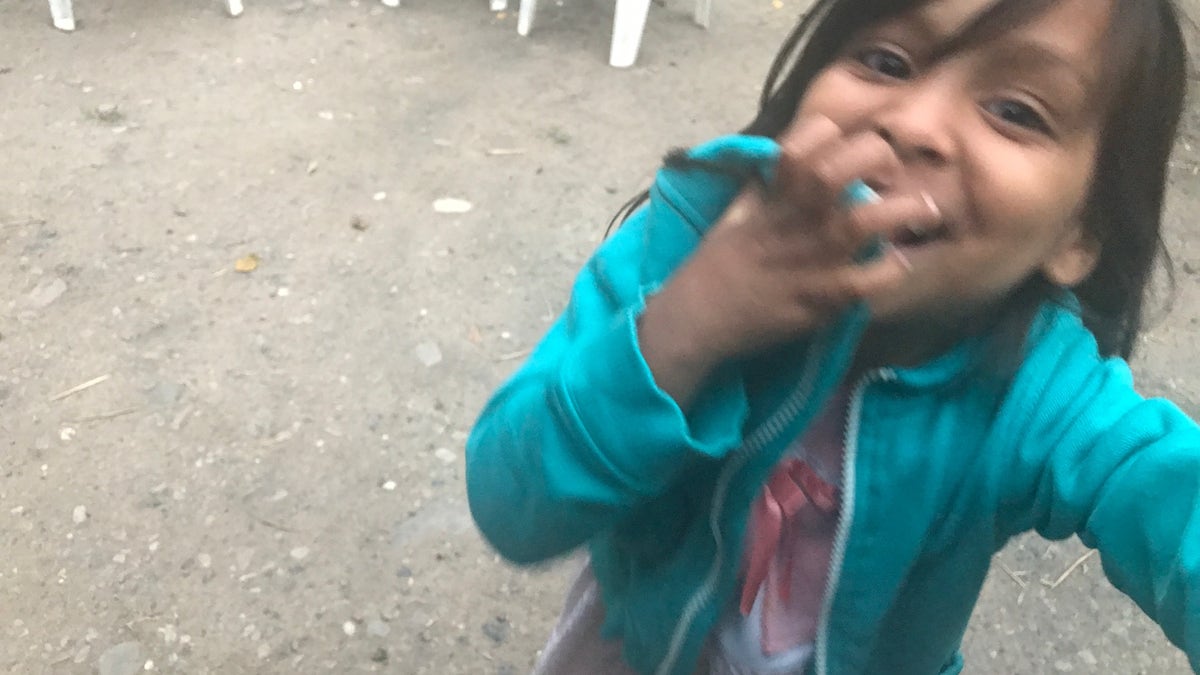
A Venezuelan migrant making the journey through Colombian plays with the only toy she has: her mother's identification card.
(Fox News/Hollie McKay)
PAMPLONA, Colombia – A little girl plays with her mother’s identification card – tossing, catching and guarding it fiercely. It’s the only thing she has to call her own.
Boys nearby play soccer with an empty soda bottle. Men, reduced to tears, hide away in makeshift tents, counting pennies to feed their families.
“It first started as a trickle, but really in the last year, it became a wave of people fleeing both for reasons of persecution and simply because they could no longer sustain themselves,” Todd Chapman, the U.S Ambassador to Ecuador, told Fox News. “People don’t leave their children behind because they want to. It is because of the dire circumstances on the ground in Venezuela are causing people to take this consequential and dangerous and desperate decision to seek a better life elsewhere.”
The depth of the catastrophe threatens to unravel the stability and wreak financial havoc beyond just Latin America - with little end in sight. It's quite simply "the worst crisis the region has seen in modern history," according to Moises Rendon, associate director and fellow for the Center for Strategic and International Studies (CSIS).
“You have a humanitarian and economic collapse, mass immigration and the government cracking down along with institutional collapse,” he said. “Combine all these aspects together, and Venezuela is fast becoming a threat for the civility of the whole region.”
Response for Venezuelans, the coordination platform for refugees and migrants, documents at least 16 countries that now need assistance in tending to the ever-burgeoning mass migration flow.
Neighboring countries have subsequently been forced to deal with spikes in crimes, sex, and drug trafficking, and criminals – both from Venezuela and from home nations – seeking to take advantage of those most desperate amid the calamity.
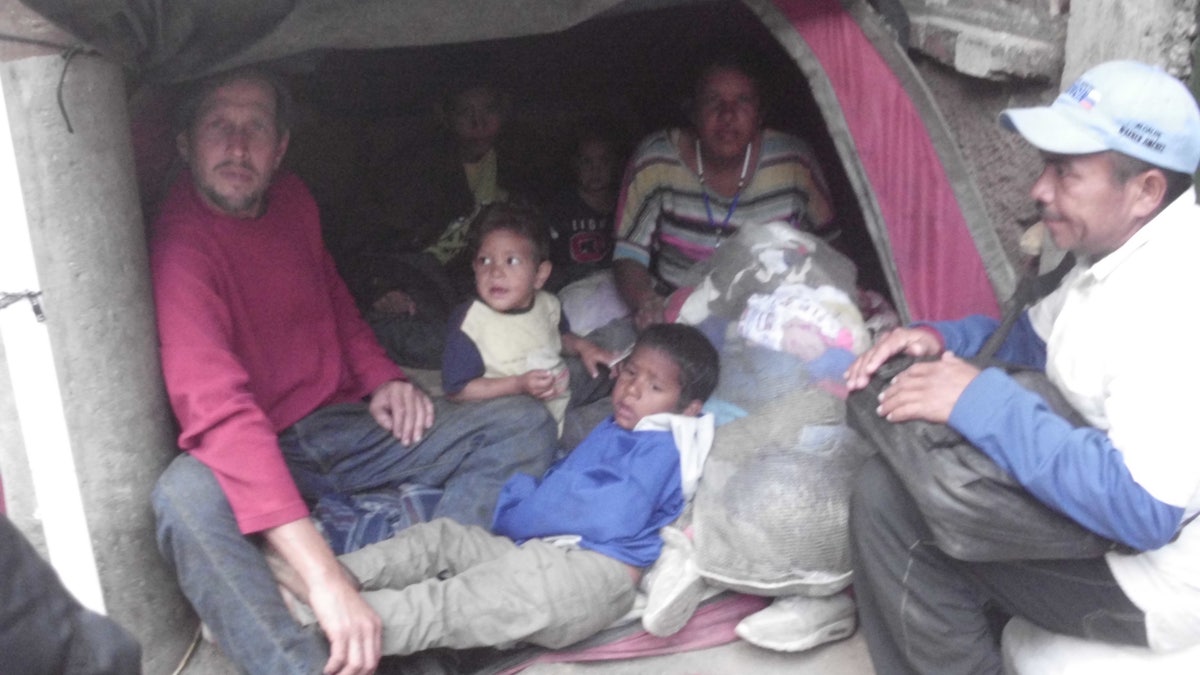
Entire families forced to make the arduous journey from Venezuela as the crisis continues. (Fox News/Hollie McKay)
In most towns and cities across Latin America, bus terminals have become sleeping hubs for new arrivals from Venezuela – but often raising the ire of authorities who have been purporting to dismantle them – given they, too, have become hubs for drug dealing, crime, sexual assault, and other illicit activities.
And for that reason, they are squalid, dirty and dangerous places for vulnerable Venezuelans. Officials refer to those leaving Venezuela as being a “mixed migration flow” rather than refugees.
Although more than 3.3 million Venezuelans are estimated to have left the country since 2015, only a small portion – for example, just 11,000 in Ecuador – have applied for asylum.
“Many just can’t feed their children so their focus is on just getting a job, anything until they can go home again,” explained UNHCR’s Representative in Ecuador, María Clara Martín. “I have rarely seen a Venezuelan who says they don’t want to return.”
Other professionals underscored the lack of information on how to apply for asylum and the needed qualifications, an issue various NGO and UN bodies are endeavoring to address.
Santiago Chavez, Ecuador’s Vice Minister of Mobility, said there are more than 300,000 Venezuelans currently living in Ecuador, with about three-quarters having entered in an “irregular” – otherwise illegal – way.
“The effort that Ecuador is having to do here is proportional to Germany allowing a million Syrian refugees in, and yet there is a big difference as Germany is a big, industrial country with a lot of resources to tend to the crisis,” Chavez said. “Ecuador, in contrast, has very limited resources.”
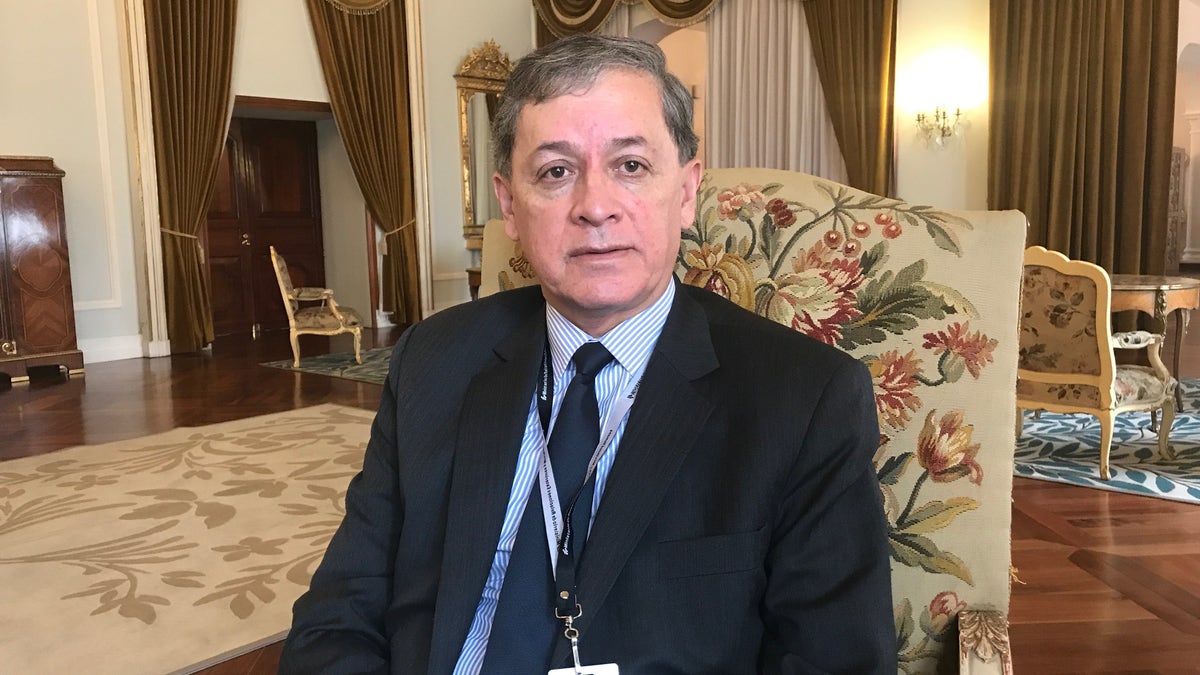
Santiago Chavez, Ecuador’s Vice Minister of Mobility (Fox News/Hollie McKay)
Jobs are hard to come by in the countries that have taken in the Venezuelans, even for those with university degrees or established professions. Antonio Ledezma, a former political prisoner, mayor of Caracas and opposition leader now exiled in Spain, told Fox News more than 64 percent of the migrants are below 30 years of age, and more than 52 percent have received higher education.
While fleeing to another nation provides some hope, most resort to street selling.
At the “Resting House” in Quito, Ecuador a group of 20-something former students and professionals take turns selling cookies in different parts of the street.
“I’ve only been able to send money home to Venezuela on two occasions,” lamented Yondel Alestre, 24, explaining that few in the shelter where he stays own a smartphone, making it difficult to contact family members. “My wife is in Colombia, where she had to go to give birth as there was no medical care in Venezuela. My other children are with my mother in Venezuela and I have to stay in Ecuador to try to work.”
The impasse has torn families apart – with some migrant describing how certain members had gone to Chile or Colombia, while others ventured to Peru or Argentina – all in a bid to send whatever they could home to their other loved ones, sick and starving in their homeland.
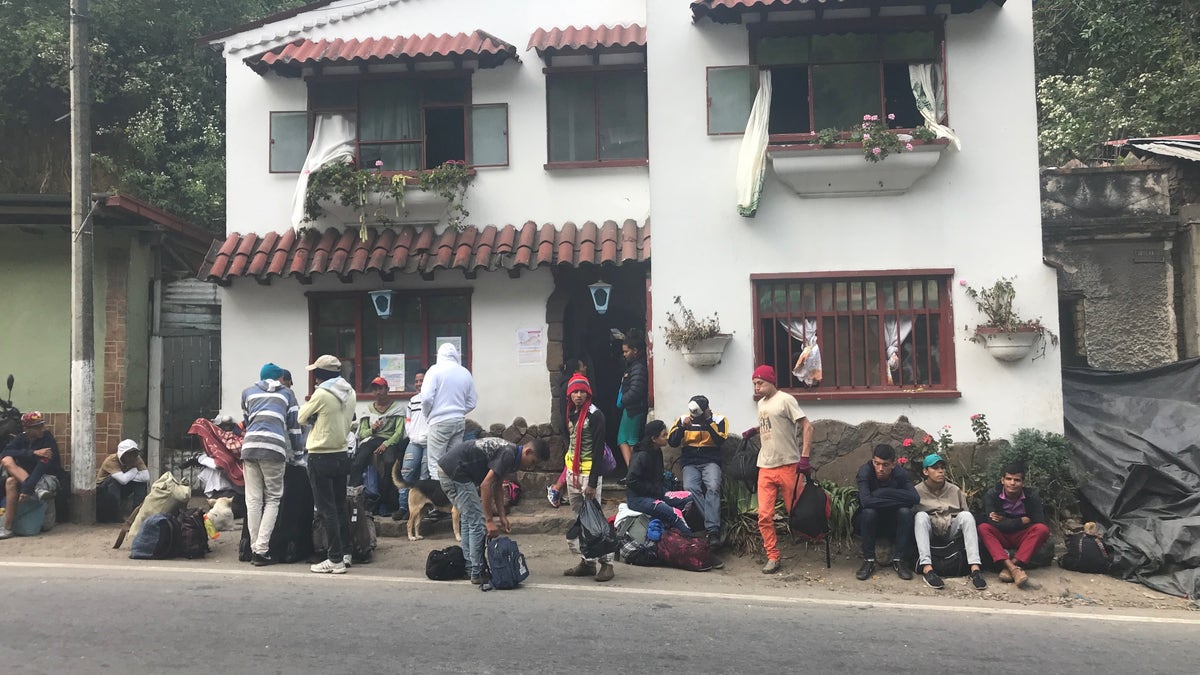
Colombians offer a reprieve to Venezuelans desperately fleeing (Fox News/Hollie McKay)
“It’s really rough what the migrants have gone through. Everyone is frustrated, depressed,” said Marcelo Viteli, the General Manager of the “Resting House” where up to 80 migrants are permitted to seek shelter for a few months after arrival.
INSIDE LATIN AMERICAN 'AMAZING RACE' STAR’S DRAMATIC ESCAPE FROM VENEZUELA
TRUMP ADMINISTRATION WALKING BACK OBAMA-ERA FOREIGN POLICY MISTAKES IN BURMA
It wasn’t so long ago that Colombians were fleeing en masse to Venezuela – then the richest nation in Latin America, which still holds the largest known oil reserves in the world – as a simmering 50-year civil war raged on. While the tables have abruptly turned, most Colombians are eager to return the generosity.
An array of Colombian locals have set up their own makeshift shelters, or opened the doors to their own homes to assist “the walkers” on their long and arduous trek from the bordering nation.
At one small hut near the border town of Cucuta, some 300 mostly women and children pass through to recharge their phones, get some sleep and soup, and pick up an item of clothing from the “Samaritan’s Purse” donation mound.
Further along the winding road, Colombian local Marta Duque – who opened the home to help Venezuelans after feeling a deep sense of sadness for what they were enduring – say she, too, has been threatened with fines and being arrested, given the hazard of having scores of migrants pouring out into the streets.
But she refuses to give up and shut down. “I have to help because I understand what they are going through, why they have to leave,” Duque said.
One young mother, Marisela, cradles her young son on Duque’s floor, and encourages him to take deep breaths.
“He is asthmatic, and there was no help for him, no medication in Venezuela, and the attacks became worse,” she said. “Life there is chaotic in every sense. I hope to get him medicine in Colombia. But without government change, there is no going home.”
The acute medicinal shortage and health dilemma not only pose great health risks to Venezuelans, but to the region at large. The country is enduring a dire shortage of vaccinations and treatments for illnesses and diseases, prompting a concern that once eradicated conditions such as measles and diptheria are not only spreading in the financially depleted nation, but now threatens millions across Latin America.
The migration in 2018 has been fast and fleeting. Ecuador, for one, went from seeing the entry of thirty to forty Venezuelans per month to a peak of around 90,000 in May this year. A “second wave” hit in October, and at least 70,000 a month have been entering since.
“People who crossed before had at least a few dollars in their pocket for basic needs. Now they have absolutely nothing,” said Victor Bautista, director for development and border integration at the foreign ministry in Colombia. “In just six months, we went from 170 thousand migrants here to one million. Sixteen months ago, we had just 32,000. Something must be done. The humanitarian issues are unbelievable, and they will hurt the entire region.”
Both government and non-governmental professionals tending to the regional calamity concurred that this year there has been a “profile shift” in those fleeing.
In the first few years of the meltdown, which gained momentum in 2015, those with some finances and education were able to buy plane tickets out. But as the situation has slowly deteriorated, those from poorer backgrounds started to escape.
One U.S government official closely monitoring the case told Fox News that while official displacement camps have not yet been established, calling this a “last resort” it is an option on the table being considered.
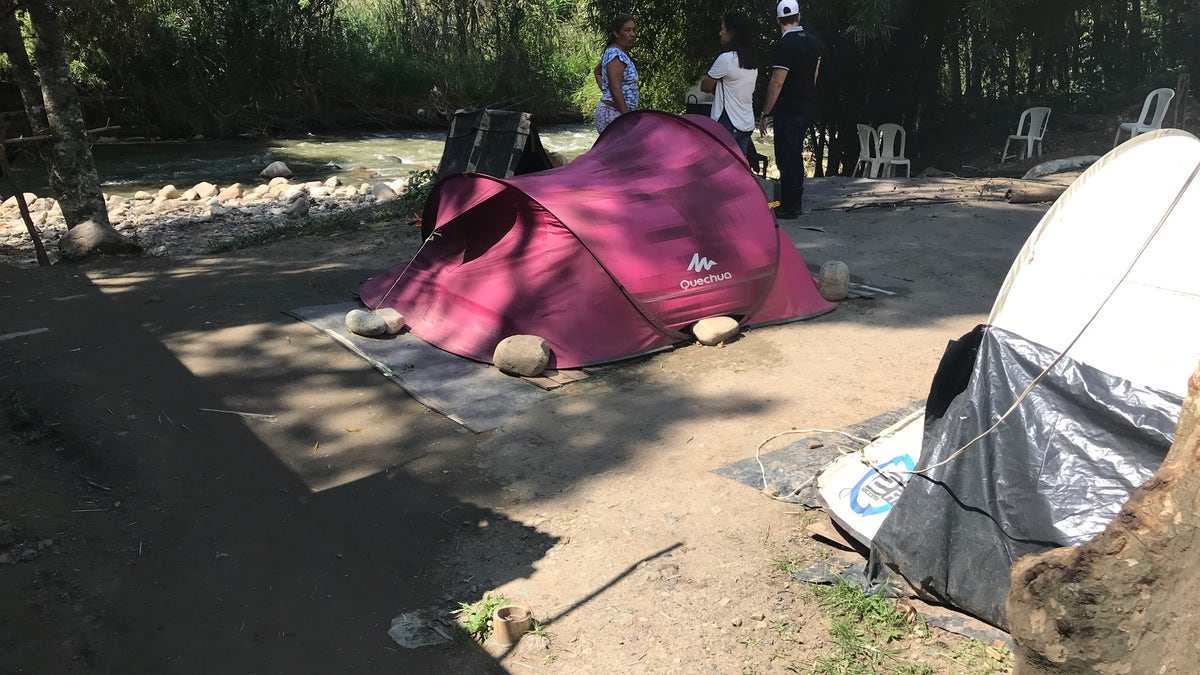
In contrast to the beginning of the crisis, those now fleeing Venezuela are considered to be the most vulnerable and are fleeing with next to nothing to their name (Fox News/Hollie McKay)
Experts surmise that at least one in 10 leaving Venezuela now are disabled, and have pointed to an uptick in “unaccompanied minors” crossing international borders – mostly boys between the ages of 15 and 17. But many don’t have documentation.
Ultimately, the buck stops with local governments who are then in-charge of tending to the minors, with local aid agencies doing their best to offer guidance and support to the already “overwhelmed” government bodies.
But with mass migration, comes surges in what some deem “xenophobia” toward Venezuelans, what others claim to be “integration problems,” and what others characterize as one citizen’s need to put their own families first, over that of legal and illegal arrivals.
“We are trying to establish programs that can be of benefit to both Ecuadorians and Venezuelans, and address the welfare concerns of both,” said the International Organization for Migration (IOM) Ecuador’s Chief of Mission, Manuel Hoff.
In several soup kitchens and shelters, separate lines and dining areas have had to be set up separate the poor locals from the Venezuelans, as to avoid any contention.
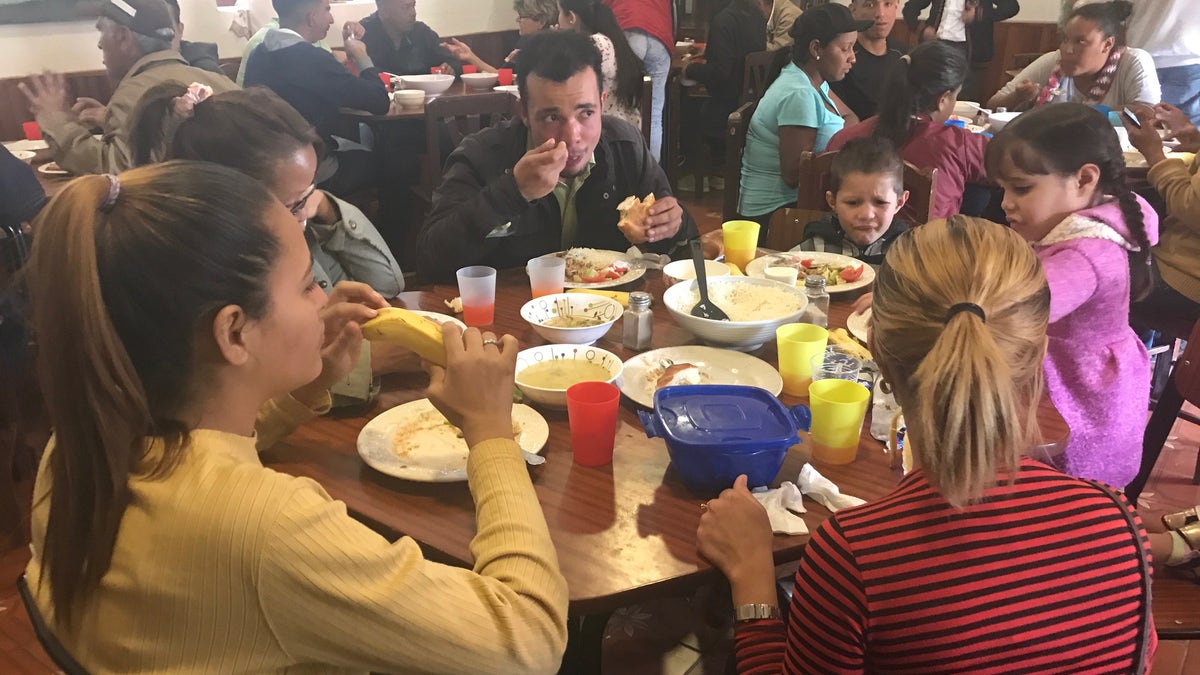
In several soup kitchens and shelters, separate lines and dining areas have had to be set up separate the poor locals from the Venezuelans as to avoid any contention. (Fox News/Hollie McKay)
Yet the end game is unclear. All signs point to the situation only worsening, especially after January 10, when Maduro begins another presidential term. Though his term is not recognized by most of the international community, which viewed the 2017 presidential election as a farce.
So Maduro will after Jan. 9 be deemed “illegitimate” in the eyes of most international players – including the United States – which has been mulling designating Venezuela a state sponsor of terrorism alongside Iran, North Korea, Syria, and Sudan.
Yet Venezuela does have some support abroad from the likes of Cuba, Iran, China, Russia and Turkey - all authoritarian regimes who say they support the country’s sovereignty. Turkish President Tayyip Erdogan this month condemned the sanctions against Venezuela, and this year Turkey became the biggest importer of non-monetary gold from Venezuela. And Russia now owns prominent parcels of at least five oil fields in the country, and is helping prevent Maduro’s government from falling into bankruptcy, despite the unfathomable levels of hyperinflation.
The Maduro regime has – for the most part – denied the existence of a major crisis in its country, instead blaming the US- and US-supported political foe for waging “economic war.”
Over the past fiscal year, the United States has already given almost $100 million – distributed through the Department of State and other agencies – to assist in the humanitarian response to the regional Venezuela contingency. In September, the U.S. pledged a further $48 million. Moreover, the Department of Defense spending in the region over the past year totaled more than $110 million.
The number of Venezuelans fleeing is expected to reach 5.3 million by the end of 2019, according to the United Nations, “in what has become the largest exodus in modern Latin American history.”
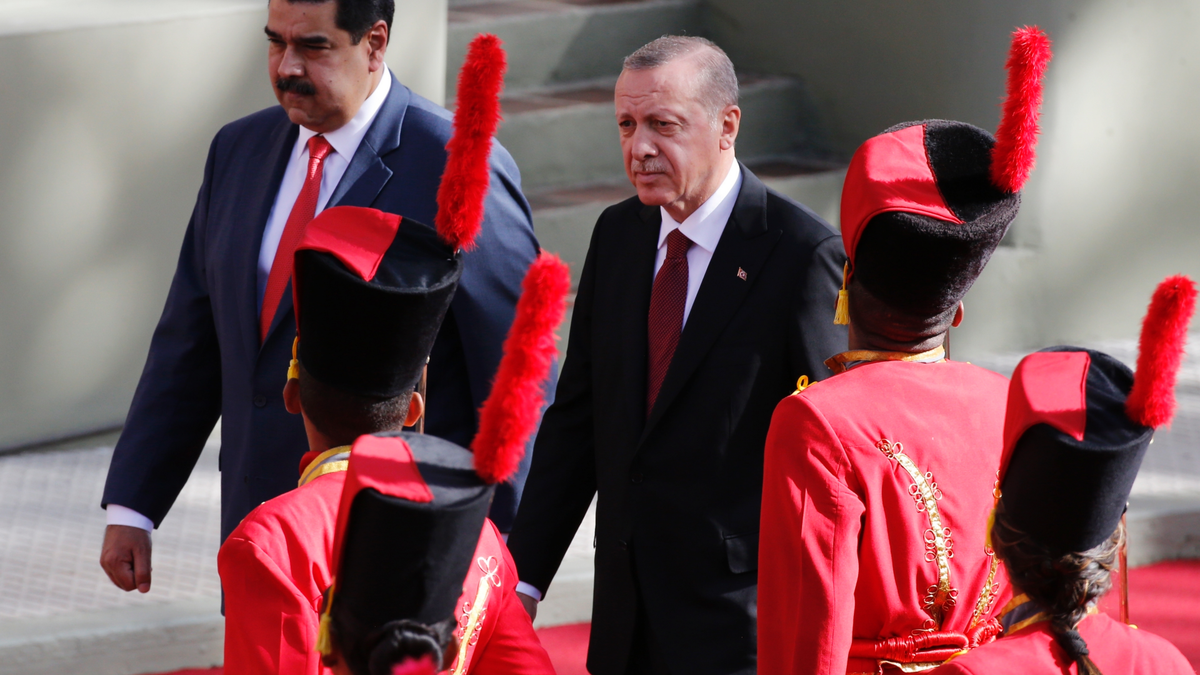
Venezuela's President Nicolas Maduro receives Turkey's President Recep Tayyip Erdogan at the Miraflores Presidential Palace in Caracas, Venezuela, Monday, Dec. 3, 2018. Erdogan is on a one-day official visit to the country. (AP Photo/Ariana Cubillos)
The U.N High Commissioner for Refugees stated that humanitarian organizations will require $738 million to provide vital services such as food and shelters to help ease the burden on receiving nations.
It is forecasted that Colombia will continue to receive the most migrants, at least another 1.2 million over the coming year totaling 2.2 million, while its expected Peru will have 1.4 million Venezuelans by the end of 2019. Ecuador, Brazil, as well as other countries in the Southern Cone, Central America and the Caribbean too are predicted to see a swell in Venezuelan arrivals.
The UN is projecting that at least two million more Venezuelans will flee their crumbling country over the course of the year.
Nonetheless, Chapman, the American Ambassador in Ecuador, underscored the U.S is committed to the cause, and said the Trump administration has long been “resolute in supporting the humanitarian response” in the region.
“What has been shocking to me is I am seeing parallels to other places I have worked – Afghanistan and Mozambique when it was the poorest country in the world,” he added. “People have that gaunt look of people who are starving, of people who have no hope. It is very troubling this is happening so close to our shores, and that is what makes finding a solution to the Venezuela crisis all the more important.”



















